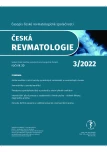-
Medical journals
- Career
Fertility disorder associated with undifferentiated connective tissue disease
Authors: Š. Tichý
Authors‘ workplace: Revmatologická klinika 1. LF UK Praha ; Revmatologický ústav Praha
Published in: Čes. Revmatol., 30, 2022, No. 3, p. 134-138.
Category: Case Report
Overview
In this article, we present the issue of pregnancy complications in patients with rheumatic diseases with a summary of the available literature. In the case report, we focus on the case of a patient with undifferentiated connective tissue disease (UCTD), who suffered from repeated spontaneous abortions in the first trimester of pregnancy, even with the use of assisted reproduction methods, without evidence of antiphospholipid syndrome or other genetic, anatomical or hormonal causes. From the literature, we find that the association of this and other complications of pregnancy, such as low birth weight, premature birth, preeclampsia, or even cesarean delivery, with chronic rheumatic inflammatory diseases, including UCTD, has been repeatedly described by many authors. In clinical practice, there is still a lack of experience in how to approach such patients, and the possibilities of therapy for these complications are limited. In the management of our patient, we consulted a currently ongoing randomized trial ILIFE (Immunosuppressants for LIving FEtuses), which aims to ascertain the effect of immunosuppressive therapy on the outcome of pregnancy in patients with UCTD suffering from repeated miscarriage. After starting a similar treatment protocol, our patient spontaneously became pregnant within 2 months of therapy initiation, and less than a year later, the patient gave birth to a healthy child.
Keywords:
complications of pregnancy in patients with a rheumatic disease – undifferentiated connective tissue disease – therapy of complications
Sources
- Andreoli L, Bertsias GK, Agmon-Levin N, et al. EULAR recommendations for women‘s health and the management of family planning, assisted reproduction, pregnancy and menopause in patients with systemic lupus erythematosus and/or antiphospholipid syndrome. Ann Rheum Dis 2017; 76(3): 476–485.
- Götestam Skorpen C, Hoeltzenbein M, Tincani A, et al. The EULAR points to consider for use of antirheumatic drugs before pregnancy, and during pregnancy and lactation. Ann Rheum Dis 2016; 75(5): 795–810.
- Procházková L. Fertilita a revmatická onemocnění. Čes. Revmatol. 2018; 26(2): 72–78.
- Smeele HTW, Dolhain RJEM. Current perspectives on fertility, pregnancy and childbirth in patients with rheumatoid arthritis. Semin Arthritis Rheum 2019; 49(3S): S32–S35.
- Winger EE, Reed JL. Treatment with tumor necrosis factor inhibitors and intravenous immunoglobulin improves live birth rates in women with recurrent spontaneous abortion. Am J Reprod Immunol 2008; 60(1): 8–16.
- Shimada H, Kameda T, Kanenishi K, et al. Effect of biologic disease-modifying anti-rheumatic drugs for patients with rheumatoid arthritis who hope to become mothers. Clin Rheumatol 2019; 38(5): 1453–1458.
- Spinillo A, Beneventi F, Locatelli E, et al. The impact of unrecognized autoimmune rheumatic diseases on the incidence of preeclampsia and fetal growth restriction: a longitudinal cohort study. BMC Pregnancy Childbirth 2016; 16(1): 313.
- Spinillo A, Beneventi F, Caporali R, Ramoni V, Montecucco C. Undifferentiated connective tissue diseases and adverse pregnancy outcomes. An undervalued association? Am J Reprod Immunol 2017; 78(6).
- Smeele HT, Röder E, Wintjes HM, Kranenburg-van Koppen LJ, Hazes JM, Dolhain RJ. Modern treatment approach results in low disease activity in 90% of pregnant rheumatoid arthritis patients: the PreCARA study. Ann Rheum Dis 2021; 80(7): 859–864.
- Radin M, Schreiber K, Cecchi I, et al. A multicentre study of 244 pregnancies in undifferentiated connective tissue disease: maternal/fetal outcomes and disease evolution. Rheumatology (Oxford) 2020; 59(9): 2412–2418.
- Yang S, Ni R, Lu Y, et al. A three-arm, multicenter, open-label randomized controlled trial of hydroxychloroquine and low-dose prednisone to treat recurrent pregnancy loss in women with undifferentiated connective tissue diseases: protocol for the Immunosuppressant regimens for LIving FEtuses (ILIFE) trial. Trials 2020; 21(1): 771.
- Mosca M, Neri R, Bombardieri S. Undifferentiated connective tissue diseases (UCTD): a review of the literature and a proposal for preliminary classification criteria. Clin Exp Rheumatol 1999; 17(5): 615–620.
- Mosca M, Tani C, Vagnani S, Carli L, Bombardieri S. The diagnosis and classification of undifferentiated connective tissue diseases. J Autoimmun 2014; 48–49 : 50–52.
- Antunes M, Scirè CA, Talarico R, et al. Undifferentiated connective tissue disease: state of the art on clinical practice guidelines. RMD Open 2019; 4(Suppl 1): e000786.
- Jablonowska B, Selbing A, Palfi M, Ernerudh J, Kjellberg S, Lindton B. Prevention of recurrent spontaneous abortion by intravenous immunoglobulin: a double-blind placebo-controlled study. Human Reprod 1999; 14(3): 838–841.
- Stephenson MD, Dreher K, Houlihan E, Wu V. Prevention of unexplained recurrent spontaneous abortion using intravenous immunoglobulin: a prospective, randomized, double-blinded, placebo-controlled trial. Am J Reprod Immunol 1998; 39(2): 82–88.
- Laskin CA, Spitzer KA, Clark CA, Crowther MR, Ginsberg JS, Hawker GA, et al. Low molecular weight heparin and aspirin for recurrent pregnancy loss: results from the HepASA Trial. J Rheumatol 2009; 36(2): 279–287.
Labels
Dermatology & STDs Paediatric rheumatology Rheumatology
Article was published inCzech Rheumatology

2022 Issue 3-
All articles in this issue
- Úvodník
- Prof. MUDr. Eduard Cmunt – průkopník české revmatologie
- Risk of cardiac and ocular toxicity of synthetic antimalarials in rheumatic diseases
- Comorbidities in spondyloarthritits
- Prevalence of spondyloarthritis in patients with acute anterior uveitis
- Interstitial lung disease in systemic connective tissue diseases – risk factors, diagnostic and treatment
- Fertility disorder associated with undifferentiated connective tissue disease
- Czech Rheumatology
- Journal archive
- Current issue
- Online only
- About the journal
Most read in this issue- Interstitial lung disease in systemic connective tissue diseases – risk factors, diagnostic and treatment
- Risk of cardiac and ocular toxicity of synthetic antimalarials in rheumatic diseases
- Fertility disorder associated with undifferentiated connective tissue disease
- Prof. MUDr. Eduard Cmunt – průkopník české revmatologie
Login#ADS_BOTTOM_SCRIPTS#Forgotten passwordEnter the email address that you registered with. We will send you instructions on how to set a new password.
- Career

